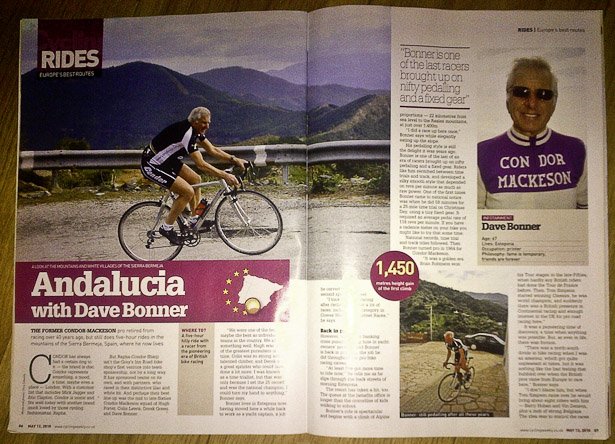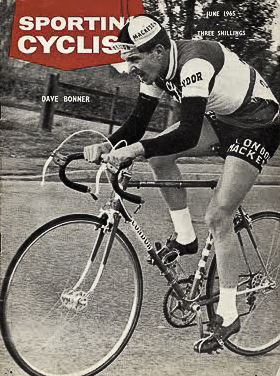The career of Dave Bonner was ending when I was just getting into cycling, but his name was one which kept cropping up in Cycling Weekly in the early 70’s and in the chats where the ‘young boys’ learned from the older guys in the club about cycling’s rich history.
He was a star on the track, in time trials and on the road; and 40 years after he quit the pro scene he’s still riding his beloved Condor in the mountains of Southern Spain.
Back in 2010 Cycling Weekly even ran a feature about his five hour runs through the mountains of Andalucía – good going for a 70 year-old.

We’ve been meaning to ‘have a word’ for ages; when we caught up with Dave a few weeks ago, here’s what he had to say.
Eight seasons as a pro, Dave?
“Yes, 1966 was my first full pro year, I was an independent in 1964 and ’65 – you could ride with the pros but weren’t on a full contract with a pro team.
“From ’64 to ’66 it was Condor-Mackeson; from ’67 to ’69 it was Mackeson-Whitbread then in 1970 it was Mackeson-Condor.
“Mackeson and Whitbread were popular stout beers of the time.
“But I still worked as a printer during most of my career as a pro cyclist.”
You were a ‘war baby.’
“Yes, I was born in 1942 and started school in 1947.
“I remember my dad having to repair my shoes every week and we still had ration books.
“There weren’t many sweets about and I can still remember when butter came off rationing.
“I got into cycling with Old Portlians CC.”
You were British Team Pursuit Champion with them.
“Yes, we won it and were second the following year.”
Tell us about your legendary Xmas Day sub-hour ’25.’
“That was on 72” fixed in 1961, I did 59:32 – that’s 118 rpm.
“I was in good shape because I used to 20 miles each way to work.
“I was paid £3 per week back then but got £6 for winning that race!”
You took the national ’25’ record.
“That was ’62; I rode gears to beat Charlie McCoy’s record with 54:28.
“I missed out on Commonwealth Games selection and was out to prove that I should have gone.”
And beat Hugh Porter to the ’25’ title.
“I usually had the better of Hughie on a time trial but he was so strong in the pursuit – I beat him to win the title in ’63, with 55:52.
“I rode the Worlds team pursuit with him in ’63 – we did 4:40 on cement in Zurich with Harry Jackson and Alan Sturgess.”
So you weren’t just a ‘tester?’
“No, I turned pro in ’64 – I should have gone to the Olympics but had a bad crash at the Good Friday meet on the track.
“I found form again for July but the selectors said it was too early!
“I rode pursuit, road races, team pursuits and I won a medal in the pro madison as well as riding the London Six Day race.
“If you ride a time trial properly it’s really, really hard – I couldn’t do it every week. I think that a lot of guys who ride time trials a lot would go better in them if they competed on the road more often. Time trials are so hard that you shouldn’t ride them all the time.”
How did you train?
“I used to ride in to work from Surrey to London – that’s a lot of red traffic lights. I’d do 50 mile runs in the evening with the last hour hard.
“I reckon I was one of the first to do interval training, an hour with one minute ‘on,’ then one minute ‘off.’ But you couldn’t too much interval training – it’s too hard.
“I’d vary my training – ride hilly routes, the climbs get you fit.”

You’ve always been a Condor man.
“I rode them when I was amateur; I was an apprentice printer at the Daily Mirror and the Condor shop was only a five or six minute walk away.
“They actually wanted me to turn pro for them before I did, but I wanted to go to the Olympics. Initially you could ride independent for two years and then revert to the amateur ranks if you didn’t make it to full pro status.
“But the BCF ended the category and we were all declared professionals. I had it in my mind to go to Brittany – I didn’t like Belgium – but there wasn’t a lot of racing for you as an independent in France.
“And it was difficult to get a ride due to the regulations limiting the number of foreigners on teams.”
You rode the Worlds on road and track.
“I was reserve in ’62 but it ended up that I rode the team time trial that year and then the team pursuit in ’63. I didn’t go in ’64 and ’65, even though I had the condition.
“I rode the pro pursuit in ’66 and ’67 then the pro road race in ’68 and ’70.”
You were still winning races in 1970, why quit?
“Mackeson stopped the sponsorship for ’71 and it was a tough time for the pro class – it was down to about 20 riders. I thought the pro class was on the brink of collapse, so didn’t ring around about a contract.
“I think the main thing though, was that Frank Westell, the team manager lost interest; I believe we probably could have got another sponsor.
“And the thing is that all the guys who quit as pros around that time got their amateur licences back pretty quickly, except for me and John Clarey.
“The BCF said we were “still too good!”
Your life’s been pretty cosmopolitan since you stopped cycling.
“I went to live in South Africa and worked in printing for about 20 years but I got fed up with the industry and got into captaining yachts.
“As a result of that I moved to Spain – with the benefit of hindsight I’d have been better in France – and I’m still here. But there’s a lot less money around to spend on luxury yachts, these days.
“I still do part time print work.”
Don’t you miss, ‘England’s green and pleasant land?’
“Yes, but the countryside here in Andalucía is lovely, the roads are quiet and most days there’s hardly a cloud in the sky – 20 degrees, even in winter you can go out in shorts.
“But I come home to England from time to time; my daughter lives in Whitley bay and I was back for the Pickwick Bicycle Club dinner in December.”
What did you think of the Lance mess?
“I felt it was a witch hunt and that USADA were out to get him; you just have to look at the other athletes who were involved and the penalties they received.”
Any regrets?
“A few; I went independent in haste because I was angry about not getting Olympic selection. I should have remained amateur longer and ridden races like the Tour de l’Avenir and Milk Race – I think if I had those behind me I’d have done better as a professional.
“And I think I packed up too soon, the team could carried on and I wish we’d done more to try and save it – there was a good squad there; Colin Lewis, Goz Goodman, Peter Green . . .”



